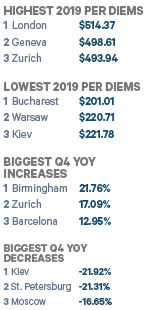
Pricing trends were a mixed bag in Europe for 2019, with upward drivers including GDP growth, inflation and steady demand increase counteracted by dragging factors such as Brexit, labor strikes, climate change protests, global trade wars and rising oil prices. Mix in a variety of market-specific conditions, and the end result was a European region where the fourth-quarter average daily cost for business travel increased and decreased in a nearly equal number of cities compared with a year prior.
London ranked as the priciest business travel destination for the 2019, with an average per diem of $514.37. The city's year-over year Q4 comparison was down more than 7 percent from 2018. That decline could be partially driven by tougher negotiations from business travel buyers, according to CWT managing director for EMEA Chris Bowen.
"We are seeing more companies introducing rate caps for bookings, especially in more expensive cities like London, putting pressure on hotels to honor group bookings and discounts," Bowen said.
Of course, looming concerns over the effect of Brexit likely will continue to roil British hotel markets over the coming year—especially if no trade deal is hammered out between the U.K. and the European Union. Should a "no-trade-deal" Brexit triumph, "companies are likely to cancel trips to the U.K. due to uncertainty regarding immigration for international travelers, which will have a knock-on effect on travel between the U.K. and Western Europe, Bowen warned.
Along with that drop in demand, a no-deal Brexit would present a second issue for U.K. hotels, noted Mike Eggleton, director, research and intelligence for BCD Travel.
"They rely heavily on labor from EU countries, which may be in short supply, depending on a deal or no-deal Brexit," Eggleton noted. "An employee shortage would push up hoteliers' costs. Hotels then would need to decide whether to raise rates to cover their higher costs or lower them to win back more business."
While the U.K. and Western Europe continue to grapple with Brexit, Russia faced a somewhat simpler issue driving down hotel rates in 2019—the pricing hangover from the 2018 World Cup. Moscow and St. Petersburg saw major year-over-year Q4 declines in average per diem rates, down 16.6 percent and 21.3 percent, respectively. The drop-off in demand from the one-time event forced hoteliers to decrease their rates back to Q4 2017 levels, according to CWT's Bowen.
"On top of the World Cup, the Asian corporate and leisure market, which is the most important one for the hotel segment in Russia, saw uncertainty in Q4 2019," Bowen added.
Among the markets with biggest per diem increases in 2019 were Barcelona—where a nearly 13 percent uptick was driven largely by Spain's continued recovery from the economic crisis of the mid-2010s—along with Lyon, at nearly 11 percent, and Zurich, at 17 percent.
While prices in Paris were down in Q4 2019, the French capital is due for a major hotel supply surge in the near future ahead of the 2024 Summer Olympics. Even with additional supply, the event could lead to pricing inflation, Bowen predicted. A recovery in the city's tourism economy—which had been negatively affected by strikes, demonstrations and terrorist attacks over the past few years—could further drive cost increases for Parisian hotels, he added.
A key factor that likely will continue to shape European hotel pricing levels is the popularity of the sharing economy, which is well-established in the region.
The prevalence of sharing services, such as Airbnb, "directly affects the pricing strategy of hotel groups," noted Bowen. Hotel suppliers "are fighting to offer, on one hand, similar service level and, on the other hand, to contain a rate inflation which would create a large gap between the two types of providers."
Risk Ratings
According to GeoSure safety data, Paris's risk score for 2019 was 40—three points safer than the 43 average of all rated global cities for the year. The safest European cities for travelers were Basel and Vienna—each with a risk score of 23—followed closely by Zurich, at 24. At the other end of the spectrum, the highest-risk European markets were Moscow and Kiev, each at 63—edging into GeoSure's "more risky" category. Risk to LGBTQ+ travelers was a leading factor in both markets, with health risk an additional vector in Moscow.